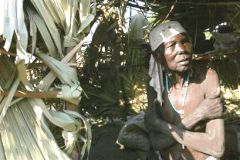Sudan’s southern peace means little for the displaced
By MOHAMED OSMAN, Associated Press Writer
KHARTOUM, Sudan, Mar 11, 2005 (AP) — Most children in this camp for displaced people have the swollen bellies of malnutrition. It is rare to see smoke wafting from the mud huts, an ominous sign that few families have food to cook.

|
|
An old woman seek refuge from the sun in her basic shelter, Thursday, Jan. 20, 2005 in a camp for returnee’s in Rumbek in southern Sudan. (AP). |
Aluel Madut, a widowed camp resident, gathers and sells grass for thatching roof to raise money to feed herself and her six children. Their diet rarely includes anything but sorghum porridge. Asked if they ever eat meat, her response is silence and a look of disbelief.
As bad as conditions were at Baryar, home to more than 4,000 people, Madut says they were better than what she has heard about the rural areas she fled during the 21-year southern war. Though the southern rebels and the government have signed a peace treaty, she has no plans to leave this camp near the population center of Wau where she has lived since 1998.
The hundreds of thousands of people displaced face the prospect of returning to areas where years of war and drought have left few resources and battered infrastructure. The United Nations has expressed fears that could “undermine efforts to bring a lasting peace to Sudan.”
In addition, according to Western organizations in Wau, land mines are everywhere. It won’t be safe for the displaced and refugees to return and for humanitarian groups to work until the two sides come up with maps to make clearing the mines possible.
The U.N. humanitarian chief, Jan Egeland, told reporters in Khartoum recently that of the US$500 million (A?372.88 million) needed to meet U.N. and other agencies’ programs to prepare for the return of the displaced and refugees, donors have only provided US$25 million (A?18.64 million) and promised another US$25 million. He said the money was badly needed now because in a few weeks the rainy season will start and then it might be too late to start work.
Some “expected money to pour in after the signing of the peace agreement, but nothing has shown up,” the UNICEF representative to Sudan, Joanna VanGerpen, told a group of U.N. and other international organizations at a briefing in Wau during a visit in early March.
“It is difficult but we have to survive,” said Madut, the widowed camp resident. “I lost my husband. No one will remarry me. But I have my kids here. Every morning I go to the bush long before the sun comes out and I come out toward the evening with a head-load of thatch grass.”
Though peace has not meant escape from the hard camp life, Madut said it has had an effect.
Now when her scavenging trips take her past government or rebel checkpoints, “nobody bothers us.
“You collect fire wood nobody bothers you. You look for food, nobody bothers you. This is peace. It is good.”
